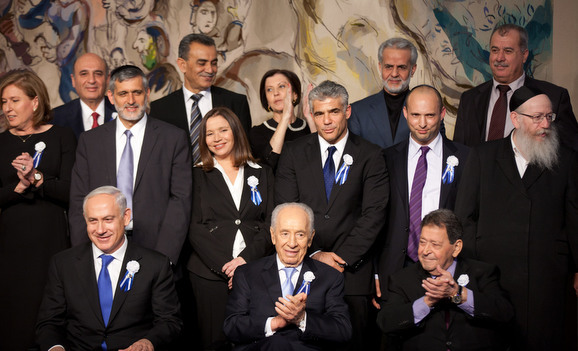IN THE MEDIA
Change drives Israel coalition
March 25, 2013 | Or Avi Guy

Or Avi-Guy
An edited version of this article appeared in The Australian
http://www.theaustralian.com.au/opinion/world-commentary/change-drives-israel-coalition/story-e6frg6ux-1226604520813
25 March 2013
During his recent historic visit to Israel, US President Barack Obama opened his statement in a joint press conference (March 21) with Israeli Prime Minister Benjamin Netanyahu by saying “Mr Prime Minister, I want to begin by congratulating you on the formation of your new government. In the United States, we work hard to find agreement between our two major parties. Here in Israel, you have to find consensus among many more. And few legislatures can compete with the intensity of the Knesset.”
Indeed congratulations were in order. The new Israeli coalition government – sworn in after weeks of negotiations only two days before the US President’ arrival – was indeed an achievement, and one the President should be able to appreciate. Just as Obama was elected on a platform of “hope and change” an appropriate way to describe the new Israeli coalition would be as “the coalition for change”.
This outcome accurately reflects the results of Israel’s election of Jan. 23, where the need for change in national priorities was the main message of Israeli voters to their representatives – including a greater focus on socio-economic concerns, social justice and the middle class. It was reflected in a change in personalities (a turnover of over 44% of Knesset members) and the success of new or re-invented parties, led by fresh faces.
This message could not be ignored in assembling the new coalition. After weeks of negotiations with Netanyahu, the close cooperation between Yesh Atid (“There is a Future”), led by former TV journalist Yair Lapid, and “Jewish Home” (Bayit Yehudi), led by hi-tech entrepreneur Naftali Bennett bore fruit in the form of a new 68-member coalition – also including former Foreign Minster Tzipi Livni’s Hatnua (“The Movement”) party.
On the surface, this new four party coalition might appear to be filled with contradictions and conflicting views on many policy areas, – but when one considers the new coalition from the prism of change and reform, the similarities outnumber the differences. On the main agenda issues – reforms in housing, education, welfare, electoral reform, reducing cost of living and the conscription of ultra-Orthodox population and their greater integration in the workforce – the coalition, and especially the new players in the scene, seem more united than ever.
This joint commitment to domestic change explains Bennett’s willingness to join a coalition with the dovish new Justice Minister Tzipi Livni named as head negotiator between Israel and the Palestinians, despite his own anti-two-state foreign policy preferences.
The strongest evidence of this re-focus on domestic reforms by Bennett and his Yesh Atid allies lies in the distribution of ministerial portifolios; Yesh Atid and Jewish Home sought influence in ministries dedicated to internal affairs – Finance, Education, Health, Social Services, Economy and Trade, Constriction and Housing, Senior Citizens. The usually high-profile foreign ministry and ministry of defence (security) were left to Netayahu’s Likud-Beitenu.
The ultra-Orthodox parties, which also presented Netanyahu with their own united front during negotiations, were left out of the coalition – a rarity in previous Israeli governing coalitions. This outcome came about because they stood in opposition to key planned reforms – not only on universalising conscription to include their constituents but also on proposed welfare and electoral arrangements.
The new coalition is, overall, centrist, pragmatic and middle-class oriented coalition – focused on reforms geared toward improving people’s daily lives, increasing socio-economic equality and distributing more equitably the tax and military service “burden”.
Obviously, foreign affairs are not going away – they are never far from the headlines in Israel. However, they were not a major part of electoral or coalition-building calculus because a broad consensus has been reached among most Israelis. This asserts Israel must do everything possible to stop Iran acquiring nuclear weapons capability, but recognises Israel can do little to influence the chaotic developments across the broader Middle East in the wake of the so-called “Arab Spring”.
On the all-important Israeli-Palestinian issue, the consensus uniting around 80% of Israelis is that a two-state peace is desirable, according to polls, but equally common is the sense that the Palestinian side is not currently ready to make the sort of deal most of the international community envisages. This is especially true with the Palestinians not only divided between Fatah in the West Bank and Hamas in Gaza, but with the regional changes leaving the moderate Fatah fearful and hesitant as it loses many of its Arab sponsors, and the rejectionist Hamas feeling ebullient, seeing potential new Islamist allies everywhere across the region.
This does not mean that the situation must remain frozen on the Israeli-Palestinian front, as Barack Obama repeatedly and correctly stressed on his visit. There are numerous interim steps that could be agreed upon with the West Bank leadership – including even potentially a “provisional Palestinian state with temporary borders” as envisioned in the 2003 Roadmap for Peace. Despite some internal differences, the pragmatic centrist new Israeli coalition might be well placed to make advances in this direction.
This new composition of Israeli politics – filled with new faces and committed to new priorities – ignites a spark of hope in the otherwise often cynical Israeli public. Meanwhile, President Obama’s visit was intended to reset both Israeli-America relations and jumpstart the moribund peace process. Now all eyes will be on the new coalition to see if it can make good on its promises, and on the US Administration to see if its efforts to reignite Israeli-Palestinian peace progress can overcome the long-standing refusal on the Palestinian side to renew much-needed negotiations without preconditions.
Or Avi-Guy is a policy analyst for Australia/Israel and Jewish Affairs Council (AIJAC), and a PhD candidate at the University of Melbourne.
Tags: Israel





